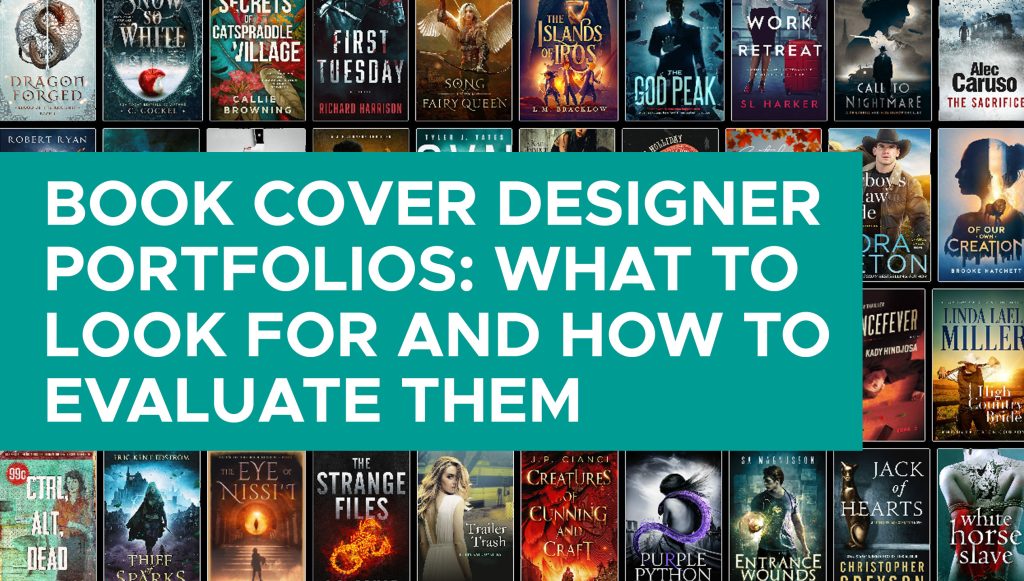When it comes to self-publishing, one of the most critical aspects is your book's cover design. A professional and eye-catching cover can make all the difference in capturing the attention of potential readers. That's why it's essential to evaluate book cover designer portfolios carefully before choosing the perfect one for your project. In this article, we will discuss what to look for in a designer's portfolio and how to evaluate their work to ensure you get the best cover for your book.
The Importance of a Professional Book Cover Design
As an author, you may be tempted to create your book cover yourself, but there are several reasons why you should opt for a professional book cover design. A well-designed cover can draw in readers, make your book stand out among the competition, and convey the story's tone and genre. Choosing the right designer is crucial, which is why you must know what to look for in a good book cover design firm.
Evaluating a Designer's Portfolio: Key Elements to Consider
When browsing through different book cover designer portfolios, ensure they demonstrate the following qualities:
1. Versatility and Creativity
An essential aspect of a book cover designer's portfolio is their ability to create covers for various genres and styles, showcasing their versatility and creativity. Look for examples of both literally and figuratively designed covers to gauge their adaptability to different projects.
2. Attention to Detail
A professional book cover designer should have a keen eye for detail. This includes ensuring all elements on the cover, such as images, fonts, and colors, work together harmoniously. Additionally, they should be able to create hardcover and paperback designs that cater to the specific requirements of each format.
3. Knowledge of Industry Trends
A good designer should be well-versed in current book cover design trends and incorporate them into their work when appropriate. By staying updated on the latest trends, they can create covers that resonate with contemporary readers and generate interest in your book.
4. Testimonials and Client Feedback
When evaluating a designer's portfolio, don't forget to check for testimonials and client feedback. These can provide valuable insight into the designer's work ethic, communication skills, and ability to meet deadlines. You can also learn about the experiences of other authors who have worked with the designer, which can help you choose the perfect cover artist for your project.
The Evaluation Process: Asking the Right Questions
Once you have narrowed down the list of potential designers, it's crucial to ask the right questions to ensure they are the perfect fit for your project. Some essential questions to ask include:
- What is your design process like? Understanding the Damonza cover design process, for example, can help you determine if the designer's workflow aligns with your expectations.
- How do you approach designing covers for my book's genre? This question can help you gauge the designer's understanding of your genre and their ability to create a cover that will appeal to your target audience.
- Can you provide examples of books with similar genres or themes to mine? This will allow you to see the designer's experience with projects similar to yours and assess their ability to create a cover that fits your story.
In conclusion, evaluating a book cover designer's portfolio is an essential step in finding the right designer for your project. By considering their versatility, creativity, attention to detail, knowledge of industry trends, and client feedback, you can make an informed decision and get the best cover for your book. Remember to ask the right questions and think about essential aspects like your book's title when working with your chosen designer. With the perfect cover design, your book will be well on its way to success.
Additional Factors to Consider When Evaluating Designer Portfolios
Beyond the key elements and questions mentioned above, there are other factors to consider when evaluating a book cover designer's portfolio:
5. Effective Communication and Collaboration
A successful book cover design project requires effective communication and collaboration between the author and designer. Look for testimonials and feedback that highlight the designer's ability to listen to the author's input, provide valuable suggestions, and work together towards a common goal.
6. Editing and Formatting Services
Some book cover designers also offer additional services such as formatting and proofreading. These services can be valuable for self-published authors who want to ensure their book is polished and professional, both inside and out. If a designer offers these services, factor them into your evaluation process.
7. Success Stories and Author Accomplishments
Another element to consider when evaluating a designer's portfolio is their track record of success. Look for examples of books with covers designed by the firm that have achieved notable accomplishments, such as bestseller status or awards. These stories can provide insights into the traits shared by successful authors and offer valuable lessons for your own publishing journey.
8. Experience with Authors at Different Stages of Their Careers
A book cover designer's ability to work with authors at various stages of their careers is essential. Some designers may have experience working with authors who began their careers writing one thing and finished with another, while others may have collaborated with established authors such as Vivian Arend or Lee Goldberg. This experience can provide valuable insights into the designer's adaptability and willingness to work with authors of all levels of experience.
Making the Final Decision: Trust Your Instincts
After considering all of the factors mentioned above, it's time to make a decision on the best book cover designer for your project. Trust your instincts and choose the designer whose portfolio resonates most with you, your genre, and your vision for your book.
Remember, a professional book cover design is not only essential for attracting readers but also for conveying your book's essence and story. By carefully evaluating designer portfolios, asking the right questions, and considering additional factors such as communication, success stories, and experience, you can find the perfect designer to bring your book to life.
Once you have made your decision, work closely with your designer to ensure your book's cover meets your expectations and appeals to your target audience. This collaboration, combined with a well-written author bio and a comprehensive guide for self-published authors, will set your book up for success and help you navigate the world of self-publishing with confidence.








2 Responses